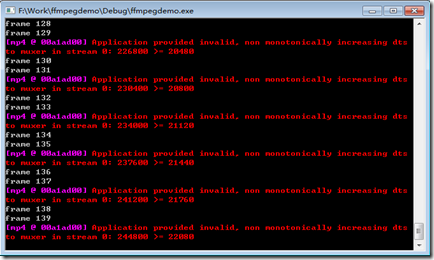本篇将使用上节http://www.cnblogs.com/wenjingu/p/3977015.html中编译好的库文件通过rtsp获取网络上的h264裸流并保存到mp4文件中。
1、VS2010建立VC++ win32控制台项目
2、在工程目录下建立lib目录和include目录,将已编译好的lib拷打lib下,include拷到include下,dll拷到Debug目录下
3、工程属性--配置属性--VC++目录--包含目录,添加ffmpeg头文件目录及其他第三方头文件目录
链接器--常规--附加库目录,添加lib目录
链接器--输入--附加依赖项,添加各个lib名
4、设计和实现:
4.1 设计思路:
组件和网络初始化——>打开网络流——>获取网络流信息——>根据网络流信息初始化输出流信息——>创建并打开mp4文件——>写mp4文件头
——>循环读取输入流并写入mp4文件——>写文件尾——>关闭流,关闭文件
4.2 关键数据结构:
AVFormatContext,AVStream,AVCodecContext,AVPacket,AVFrame等,它们的关系解释如下:
一个AVFormatContext包含多个AVStream,每个码流包含了AVCodec和AVCodecContext,AVPicture是AVFrame的一个子集,
他们都是数据流在编解过程中用来保存数据缓存的对像,从数据流读出的数据首先是保存在AVPacket里,也可以理解为一个AVPacket最多只包含一个AVFrame,
而一个AVFrame可能包含好几个AVPacket,AVPacket是种数据流分包的概念。
4.3 关键函数:
int avformat_open_input(AVFormatContext **ps, const char *filename, AVInputFormat *fmt, AVDictionary **options); //打开网络流或文件流
int avformat_write_header(AVFormatContext *s, AVDictionary **options);//根据文件名的后缀写相应格式的文件头
int av_read_frame(AVFormatContext *s, AVPacket *pkt);//从输入流中读取一个分包
int av_interleaved_write_frame(AVFormatContext *s, AVPacket *pkt);//往输出流中写一个分包
int av_write_trailer(AVFormatContext *s);//写输出流(文件)的文件尾
4.4 代码:
#include "stdafx.h" #ifdef __cplusplus extern "C" { #endif #include <libavcodec/avcodec.h> #include <libavdevice/avdevice.h> #include <libavformat/avformat.h> #include <libavfilter/avfilter.h> #include <libavutil/avutil.h> #include <libswscale/swscale.h> #include <stdlib.h> #include <stdio.h> #include <string.h> #include <math.h> #ifdef __cplusplus } #endif
以上为引用C库和ffmpeg库的头文件。
static AVFormatContext *i_fmt_ctx; static AVStream *i_video_stream; static AVFormatContext *o_fmt_ctx; static AVStream *o_video_stream; static bool bStop = false; static unsigned __stdcall rtsp2mp4(void * pThis) { avcodec_register_all(); av_register_all(); avformat_network_init(); /* should set to NULL so that avformat_open_input() allocate a new one */ i_fmt_ctx = NULL; char rtspUrl[] = "rtsp://admin:12345@192.168.10.76:554"; const char *filename = "1.mp4"; if (avformat_open_input(&i_fmt_ctx, rtspUrl, NULL, NULL)!=0) { fprintf(stderr, "could not open input file "); return -1; } if (avformat_find_stream_info(i_fmt_ctx, NULL)<0) { fprintf(stderr, "could not find stream info "); return -1; } //av_dump_format(i_fmt_ctx, 0, argv[1], 0); /* find first video stream */ for (unsigned i=0; i<i_fmt_ctx->nb_streams; i++) { if (i_fmt_ctx->streams[i]->codec->codec_type == AVMEDIA_TYPE_VIDEO) { i_video_stream = i_fmt_ctx->streams[i]; break; } } if (i_video_stream == NULL) { fprintf(stderr, "didn't find any video stream "); return -1; } avformat_alloc_output_context2(&o_fmt_ctx, NULL, NULL, filename); /* * since all input files are supposed to be identical (framerate, dimension, color format, ...) * we can safely set output codec values from first input file */ o_video_stream = avformat_new_stream(o_fmt_ctx, NULL); { AVCodecContext *c; c = o_video_stream->codec; c->bit_rate = 400000; c->codec_id = i_video_stream->codec->codec_id; c->codec_type = i_video_stream->codec->codec_type; c->time_base.num = i_video_stream->time_base.num; c->time_base.den = i_video_stream->time_base.den; fprintf(stderr, "time_base.num = %d time_base.den = %d ", c->time_base.num, c->time_base.den); c->width = i_video_stream->codec->width; c->height = i_video_stream->codec->height; c->pix_fmt = i_video_stream->codec->pix_fmt; printf("%d %d %d", c->width, c->height, c->pix_fmt); c->flags = i_video_stream->codec->flags; c->flags |= CODEC_FLAG_GLOBAL_HEADER; c->me_range = i_video_stream->codec->me_range; c->max_qdiff = i_video_stream->codec->max_qdiff; c->qmin = i_video_stream->codec->qmin; c->qmax = i_video_stream->codec->qmax; c->qcompress = i_video_stream->codec->qcompress; } avio_open(&o_fmt_ctx->pb, filename, AVIO_FLAG_WRITE); avformat_write_header(o_fmt_ctx, NULL); int last_pts = 0; int last_dts = 0; int64_t pts, dts; while (!bStop) { AVPacket i_pkt; av_init_packet(&i_pkt); i_pkt.size = 0; i_pkt.data = NULL; if (av_read_frame(i_fmt_ctx, &i_pkt) <0 ) break; /* * pts and dts should increase monotonically * pts should be >= dts */ i_pkt.flags |= AV_PKT_FLAG_KEY; pts = i_pkt.pts; i_pkt.pts += last_pts; dts = i_pkt.dts; i_pkt.dts += last_dts; i_pkt.stream_index = 0; //printf("%lld %lld ", i_pkt.pts, i_pkt.dts); static int num = 1; printf("frame %d ", num++); av_interleaved_write_frame(o_fmt_ctx, &i_pkt); //av_free_packet(&i_pkt); //av_init_packet(&i_pkt); Sleep(10); } last_dts += dts; last_pts += pts; avformat_close_input(&i_fmt_ctx); av_write_trailer(o_fmt_ctx); avcodec_close(o_fmt_ctx->streams[0]->codec); av_freep(&o_fmt_ctx->streams[0]->codec); av_freep(&o_fmt_ctx->streams[0]); avio_close(o_fmt_ctx->pb); av_free(o_fmt_ctx); return 0; } int _tmain(int argc, char **argv) { //ffplayer(); bStop = false; HANDLE hth; unsigned uiThreadID; hth = (HANDLE)_beginthreadex( NULL, // security 0, // stack size rtsp2mp4, NULL, // arg list 0, //CREATE_SUSPENDED so we can later call ResumeThread() &uiThreadID ); if ( hth == 0 ) { printf("Failed to create thread "); return -1; } printf("按任意键停止录像 "); getchar(); bStop = true; printf("按任意键退出 "); getchar(); return 0; }
原来的代码没有为存储流功能单独开线程,会导致写文件尾的语句执行不到,现在改为用一个单独的线程来执行。
5、测试
如上图为存储视频流过程中程序的打印结果。生成的mp4文件可以用任意支持该格式的播放器播放。现在还无法做到一边存储一边回放录像,下篇再完善吧。
